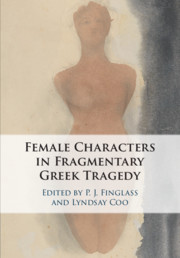Book contents
- Female Characters in Fragmentary Greek Tragedy
- Female Characters in Fragmentary Greek Tragedy
- Copyright page
- Contents
- Notes on Contributors
- Preface
- Abbreviations
- 1 Introduction
- Part I Themes
- Part II Plays
- 7 Dancing on the Plain of the Sea
- 8 Europa Revisited
- 9 When Mothers Turn Bad
- 10 The Music One Desires
- 11 Fragmented Self and Fragmented Responsibility
- 12 Female Agency in Euripides’ Hypsipyle
- 13 Making Medea Medea
- Bibliography
- General Index
- Index of main female characters discussed
12 - Female Agency in Euripides’ Hypsipyle
from Part II - Plays
Published online by Cambridge University Press: 11 June 2020
- Female Characters in Fragmentary Greek Tragedy
- Female Characters in Fragmentary Greek Tragedy
- Copyright page
- Contents
- Notes on Contributors
- Preface
- Abbreviations
- 1 Introduction
- Part I Themes
- Part II Plays
- 7 Dancing on the Plain of the Sea
- 8 Europa Revisited
- 9 When Mothers Turn Bad
- 10 The Music One Desires
- 11 Fragmented Self and Fragmented Responsibility
- 12 Female Agency in Euripides’ Hypsipyle
- 13 Making Medea Medea
- Bibliography
- General Index
- Index of main female characters discussed
Summary
This chapter restores the play Hypsipyle to a central place in discussions of female agency in tragedy by demonstrating how the intricacies of its plot result from a series of interconnected decisions made by women. At critical junctures both before and within the timeframe of the play itself, it is the female characters Hypsipyle, Eurydice and Eriphyle whose actions determine the course of the plot and have far-reaching implications for each other. The analysis in this chapter shows how the play’s happy ending – which sees Hypsipyle finally re-united with her twin sons – is made possible only because of a long series of choices enacted by these three women. In particular, Eurydice’s decision to exercise forgiveness and spare Hypsipyle, whose neglect of her son Opheltes has led to his death, marks a powerful departure from the vengeful mothers that we find in other tragedies. Through these characters, Euripides articulates a view of women’s experience and subjectivity that is no less rich and engaging than the male world of the unfolding expedition against Thebes, which forms this play’s backdrop.
- Type
- Chapter
- Information
- Female Characters in Fragmentary Greek Tragedy , pp. 198 - 215Publisher: Cambridge University PressPrint publication year: 2020

